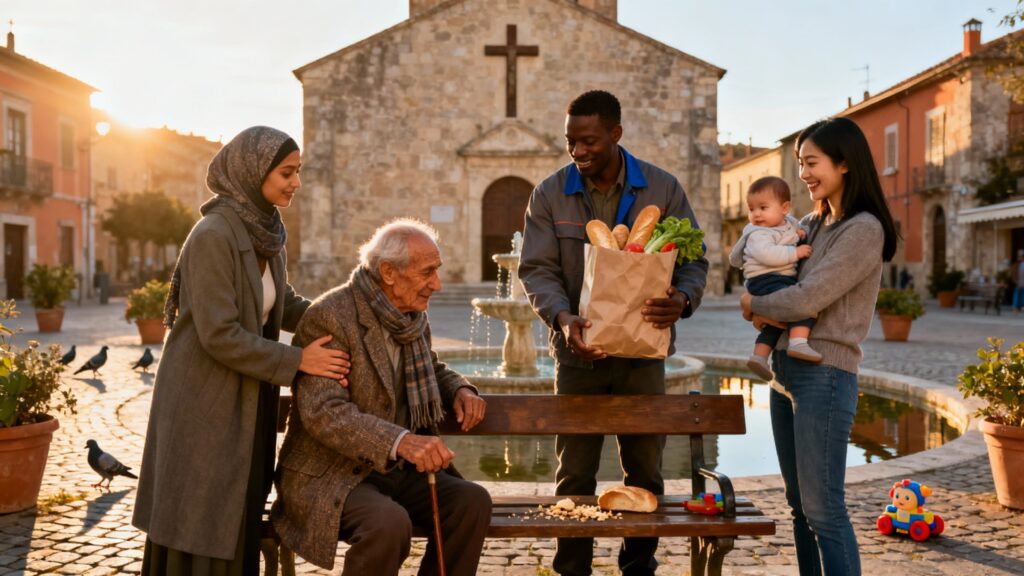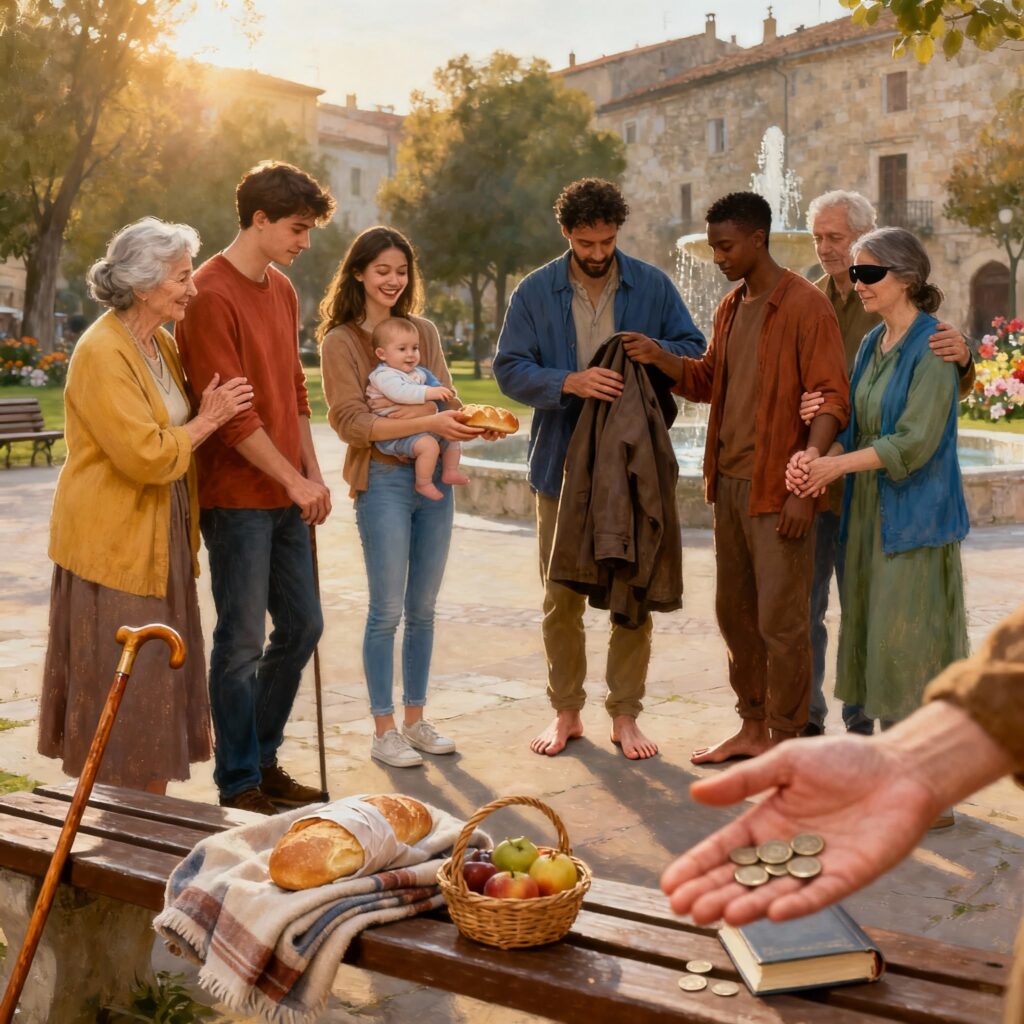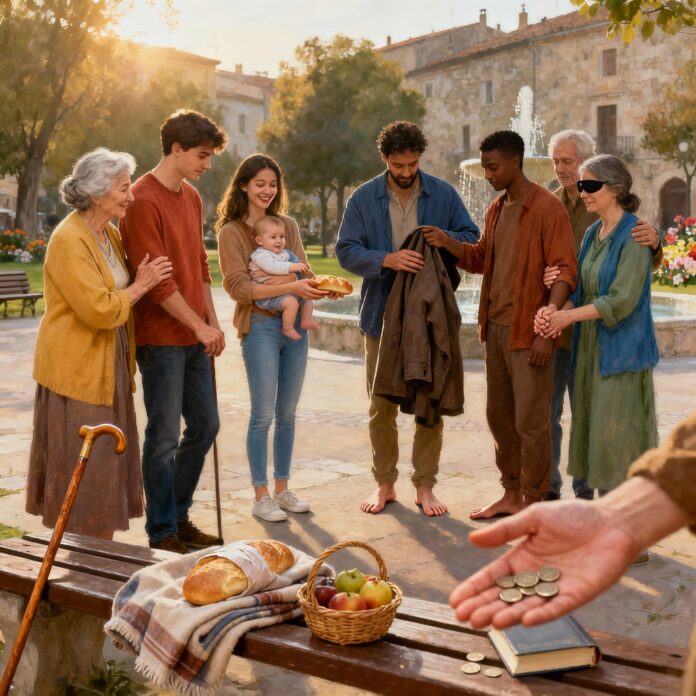Reading from the Letter of Saint Paul the Apostle to the Romans
Brothers,
owe no one,
except for that of mutual love,
because he who loves others
has fully fulfilled the Law.
The Law states:
You shall not commit adultery,
You shall not commit murder.,
You shall not commit theft.,
You shall not covet.
These commandments and all the others
can be summed up in this statement:
You shall love your neighbor as yourself.
Love does no harm to others.
Therefore, the full fulfillment of the Law,
It's love.
– Word of the Lord.
Living the law fully through love: a path of freedom and grace
Refocusing on love as the pinnacle of law.
In an age where morality often seems fragmented or relativized, biblical wisdom brings us back to a simple yet revolutionary truth: love is the key to fully living according to divine law. This conviction, proclaimed by Saint Paul in his letter to the Romans, transcends mere ethics to become a true spiritual vocation, a call to transform our relationships and our hearts. This article proposes to explore this illuminating truth, revealing its theological richness, its ethical scope, and its concrete implications for our daily lives.
A historical, literary and religious context
The passage from Saint Paul's letter to the Romans is situated within a specific context: the early first century, a time when Judaism and the pagan world coexisted in a rapidly evolving society. By addressing this letter to a mixed community, Paul seeks to reaffirm the essence of the Christian faith: the law of love, which transcends the specific commandments of the Torah and encapsulates all divine demands in a single statement. The text is rooted in a spiritual tradition where love is not merely a feeling, but an active practice, a virtue to be embodied in every relationship. Reading this passage, whether in liturgy or personal meditation, offers a gateway to inner freedom, emphasizing that respecting the laws is first and foremost a matter of the heart, of the will to truly love.
A guiding idea: love as the complete fulfillment of the law
This passage invites us to understand that love is not just another value, but the very summit of moral and spiritual life. For Saint Paul, the true revelation of God's law is found in mutual love, which encompasses all other requirements. The power of this idea lies in its paradoxical simplicity: by loving, we live the law fully, leaving no room for guilt or constraint. This conception redefines morality as an inner journey, where freedom and responsibility meet in tenderness and selfless commitment. Thus, the daily practice of love becomes the sign of a living and active faith, capable of transcending legalistic principles to reach the heart of the Gospel.
The reconciliation between justice and love
Love doesn't do harm
A key point to emphasize is that true love is manifested concretely by respecting one's neighbor and avoiding all harm. According to Paul, love does not engender adultery, murder, theft, or covetousness; it opposes the logic of destruction to that of building. This aspect reminds us that justice and charity are two sides of the same coin: to love is to respect the dignity of the other by avoiding anything that could harm them. In our daily lives, this means prioritizing gentleness, patience, and understanding when facing relational challenges, always striving to establish peace rather than conflict.
The law as an expression of love
The second point connects the moral law to a relationship of love (towards God and towards our neighbor). Paul's words show that the law, which may seem like a series of constraints, finds its fullest expression in the commandment to love. This perspective invites us to rethink religious and moral rules as means to set us free, not enslaved. It is an invitation to integrate love into all our actions, discovering that true morality consists not only in avoiding evil, but in doing good with tenderness, compassion, and faithfulness.
Love as the driving force of inner freedom
Finally, this conception gives love a central place in liberating us from our complexities and our blind spots. The practice of love becomes a path to emancipation, allowing us to overcome fear, mistrust, and superficiality. Love, according to Paul, is not a weakness, but a strength that fulfills the law in a logic of grace and gratuitousness. It frees us from the tyranny of strict duty, leading us into a dynamic of inner harmony and universal brotherhood.

Love as a fundamental virtue
Remember that love is not simply an emotion, but a virtue that engages our whole being. Authentic love manifests itself in patience with flaws, in forgiveness of offenses, and in generosity toward those in need. Practicing this virtue transforms our relationships and builds a space of inner freedom. It invites us to a hormonal rhythm of action consistent with our faith.
Justice through love
Reconsidering justice as the concrete fulfillment of love. Justice is not merely an equitable distribution of goods, but a willingness to love in truth, fidelity, and compassion. Divine justice, embodied in Christ, calls us to be attentive to those who suffer, to respect the dignity of every person, and to act for peace and reconciliation. This is an essential ethical and spiritual vocation.
Love in the service of practical and ethical vocation
Love should not remain a beautiful, isolated idea, but become a driving force in our social and personal commitments. Whether in the family, at work, or in community involvement, our capacity to love authentically influences our ability to build a more just and fraternal society. Daily meditation, prayer for our loved ones, and concrete acts of solidarity are all practical ways to make love a tangible reality.
The great tradition: love at the heart of Christian spirituality
From the early Church Fathers to modern spiritualities, the concept that love is the summit of Christian life is fundamental. Augustine profoundly emphasized that the love of God is the root of all true love, while Thomas Aquinas insisted on the hierarchy of virtues in which love reigns supreme. The liturgy also celebrates this priority in the celebration of the great commandment: «You shall love your neighbor as yourself.» Spiritual tradition, through its texts, prayers, and celebrations, invites every believer to make love a way of life, a fruit of divine experience.
Meditation: Transforming words into life
- Start each day with a prayer to receive and give love.
- Rethink your daily actions as acts of selfless love.
- Make a list of the people you want to show more compassion to this week.
- Pray for one of your enemies or difficult people; seek inner reconciliation.
- Meditate on the sacrifice of Jesus as the ultimate expression of divine love.
- Find a concrete way to help or support a loved one in need.
- Reflect each evening on how you embodied love in your day.
A transformation beyond words
This passage from Saint Paul reveals that living God's law fully is not a matter of adhering to strict rules, but of opening our hearts to love. By embodying this virtue, we participate in an inner revolution, liberating and full of grace, which transforms us into authentic sons and daughters of God. Love is the royal road to building a more just, more fraternal world, more in accordance with God's will. It is not an unattainable ideal, but a concrete, daily vocation that calls each of us to an inner and social revolution.

Practical advice and tips for a life of love
- Meditate each morning on the commandment: "You shall love your neighbor as yourself.".
- Make it a habit to ask yourself, every day, how you can show more love.
- Set aside time each week to pray for your loved ones, asking for the grace to truly love them.
- Get involved in a concrete action of mutual aid or solidarity, however modest.
- Cultivate patience in your relationships, avoiding any hasty judgments.
- Make gratitude a daily ritual, to recognize the goodness in others.
- Conclude each day with a prayer of love, forgiveness, and hope.
This long journey invites us to renew our commitment to love every day, because it is in this love that true freedom and true life reside.


